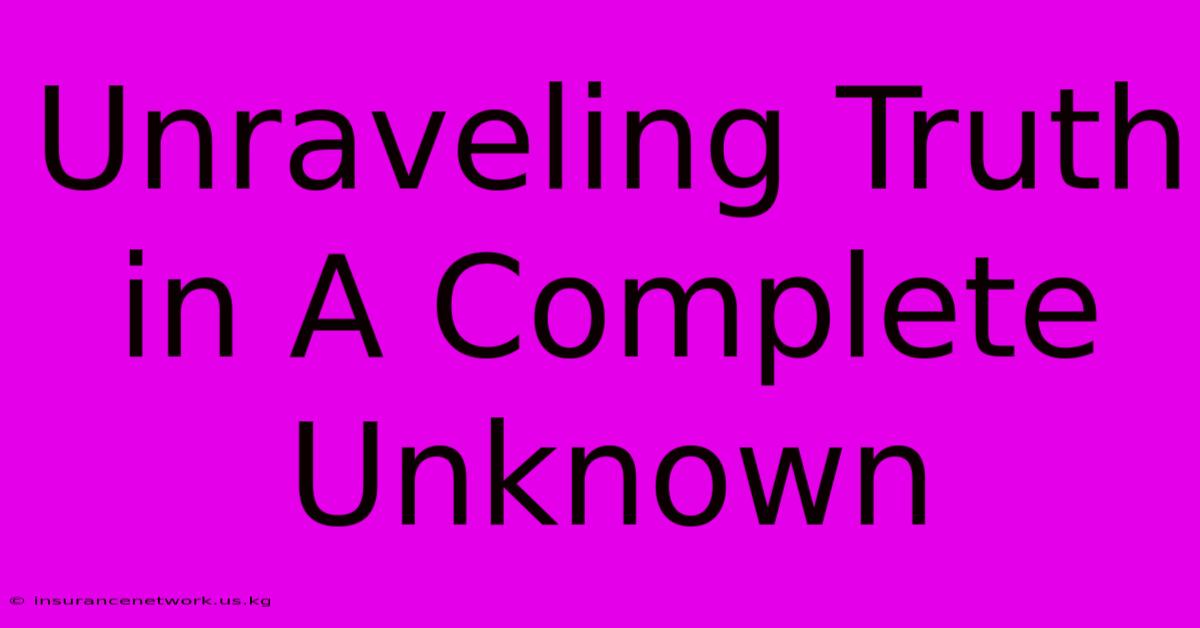Unraveling Truth In A Complete Unknown

Discover more detailed and exciting information on our website. Click the link below to start your adventure: Visit Best Website insurancenetwork.us.kg. Don't miss out!
Table of Contents
Unraveling Truth in a Complete Unknown: Navigating Uncertainty and Finding Answers
The human experience is fundamentally intertwined with the pursuit of truth. Yet, we often find ourselves navigating situations shrouded in mystery, facing a complete unknown. This inherent uncertainty can be daunting, but understanding how to approach such situations is crucial for personal growth and effective decision-making. This article delves into strategies for unraveling truth when confronted with the enigmatic, emphasizing the importance of critical thinking, open-mindedness, and a willingness to embrace ambiguity.
The Nature of the Unknown
Before embarking on a quest for truth in the unknown, it's essential to acknowledge the nature of uncertainty itself. The unknown is, by definition, unpredictable and potentially unsettling. This doesn't mean, however, that it's inherently unknowable. The challenge lies in adopting the right approach and mindset. Fear and avoidance often hinder our progress, while curiosity and a willingness to explore open doors to understanding.
Embracing Ambiguity: The First Step
Many people are uncomfortable with ambiguity. We crave clear-cut answers and definitive solutions. However, when facing a complete unknown, clinging to this desire can be counterproductive. Instead, embracing ambiguity as a necessary part of the process is key. This involves accepting that not all questions will have immediate answers and that the path to truth may be winding and unexpected.
Strategies for Unraveling Truth in Uncertainty
Successfully navigating the unknown requires a multi-faceted approach, encompassing several key strategies:
1. Gather Information: The Power of Research
The first step in unraveling truth is to systematically gather information. This might involve:
- Researching relevant sources: Explore reputable books, articles, and studies to build a foundation of knowledge.
- Seeking expert opinions: Consult individuals with specialized knowledge or experience related to the unknown.
- Observing and documenting: Pay close attention to details, record observations, and maintain detailed notes.
The goal isn't necessarily to find all the answers immediately, but rather to build a comprehensive picture of the situation, identifying potential leads and avenues for further investigation.
2. Critical Thinking: Separating Fact from Fiction
In the age of misinformation, critical thinking is more important than ever. When evaluating information, consider the following:
- Source credibility: Is the source reputable, unbiased, and evidence-based?
- Evidence quality: Is the evidence strong, reliable, and consistent?
- Logical reasoning: Does the information make logical sense in the context of what you already know?
Learning to differentiate fact from fiction is essential to avoid misleading conclusions and to reach a clearer understanding of the truth.
3. Open-mindedness: Considering Multiple Perspectives
Bias can significantly cloud our judgment, especially when dealing with complex or emotionally charged unknowns. To combat this, maintain an open mind and actively seek out diverse perspectives. Consider alternative explanations, even if they initially seem unlikely. A willingness to challenge your own assumptions and biases is crucial for effective truth-seeking.
4. Hypothesis Testing: Formulating and Refining Ideas
As you gather information and consider different perspectives, formulate hypotheses – educated guesses – about what might be true. Then, rigorously test these hypotheses by gathering more data and critically evaluating the evidence. Be prepared to revise or abandon hypotheses as new information emerges. This iterative process is vital for refining your understanding and drawing more accurate conclusions.
Conclusion: The Ongoing Pursuit of Truth
Unraveling truth in a complete unknown is a process, not a destination. It's a journey characterized by exploration, critical thinking, and a willingness to embrace ambiguity. By employing the strategies outlined above—gathering information, practicing critical thinking, maintaining open-mindedness, and testing hypotheses—you can significantly increase your chances of uncovering truth even amidst uncertainty. The pursuit of truth is an ongoing endeavor, requiring patience, perseverance, and a commitment to seeking answers, even when the path forward remains unclear. The journey itself can be as rewarding as the destination.

Thank you for visiting our website wich cover about Unraveling Truth In A Complete Unknown. We hope the information provided has been useful to you. Feel free to contact us if you have any questions or need further assistance. See you next time and dont miss to bookmark.
Featured Posts
-
Is Taylor Swift At Chiefs Game Pittsburgh
Dec 26, 2024
-
Mexican Singer Dulce Dead At Age
Dec 26, 2024
-
Nfl Christmas Schedule Chiefs Steelers
Dec 26, 2024
-
Dulce Singer Passes Away At 69
Dec 26, 2024
-
Live Stream Ravens Vs Texans Week 17
Dec 26, 2024
